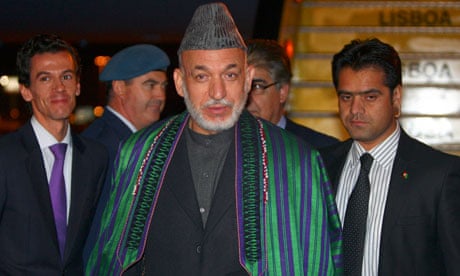Afghanistan
The "war on terror" and the Taliban will dominate Saturday morning in Lisbon, with Nato leaders joined by Hamid Karzai, government figures of all 50 countries engaged in the Afghan campaign, and Ban Ki-moon, the UN chief. Exit strategy and transition to Afghan ownership are the key topics. David Cameron said this week 2015 was a "clear deadline" for the withdrawal of UK troops.
The aim is to try to discern "a light at the end of the tunnel", with leaders seeking to chart a transition plan being effected from next summer and aiming for a main evacuation of foreign forces by 2014-15.
The idea is to name as soon as possible which of Afghanistan's 39 provinces are ready to be handed over to the Afghan National Army and to civil governorship.
There is a risk of humiliation in naming areas ripe for Afghan government and decisions later being reversed. Also, Nato remains short of 2,000 trainers for the Afghan army, hurting the exit strategy.
Russia
Barack Obama's campaign to "reset" relations with Moscow may be set back by his mid-term election battering and its impact on arms control with the Russians. But President Dmitry Medvedev will also be in Lisbon for a Russia-Nato summit amid signs of a warming.
The US and Germans are keen to rope the Russians into revised missile shield plans in Europe. Eastern Europe, perennially wary of the Russians, has been given security assurances in return for being nicer to Moscow. The prospect of a US and Nato withdrawal from Afghanistan appears to be encouraging Moscow to see that US success could be in Russia's interest. The Russians are pledging more help on allied transit in and out of Afghanistan, co-operation on countering the heroin trade, and on training. There could be a short-term boost to Russia-west relations. Longer-term problems remain.
The Europeans
Twenty-one of the EU's 27 countries are in Nato, yet the two organisations occupy parallel universes in Brussels. It's a hardy perennial, Nato-EU frictions in places from Kosovo to Afghanistan, as well as at the policy and strategy level.
Catherine Ashton, EU foreign policy chief, wrote to Nato chief, Anders Fogh Rasmussen, this week pledging fresh efforts to do something about it.
The biggest problem is (in Nato) Turkey and (in EU) Cyprus. Both the union and alliance have imported the Cyprus dispute to paralysing effect. The Turks make demands on the EU and veto Nato collaboration, while the Greek Cypriots block the EU from working with Turkey and Nato. No breakthrough expected.
All for one and one for all
Nato's core mission of mutual defence in Europe has been fraying since the end of the cold war and because of ever more ambitious and expensive expeditionary campaigns in the Balkans and Asia.
The former Soviet captive states of central and eastern Europe have been complaining loudly about the erosion of Article 5 security guarantees, given the rise of Vladimir Putin's Russia and since cyber-attacks on Estonia in 2007 and the Russian war in Georgia in 2008.
The new Nato concept will re-emphasise Article 5 and mutual defence. The east Europeans are a bit more relaxed.
